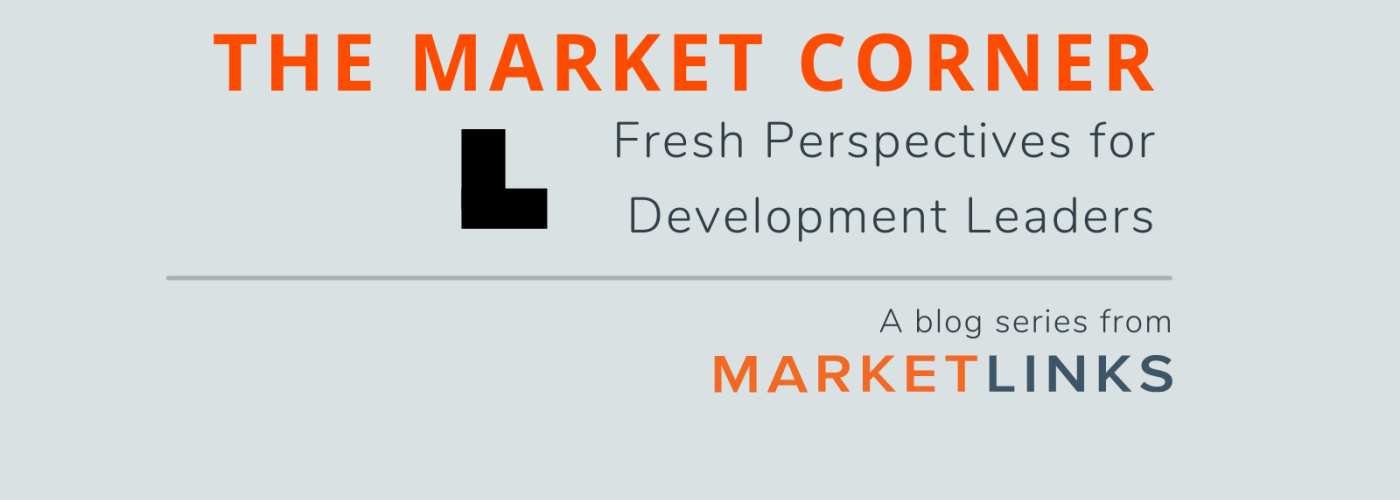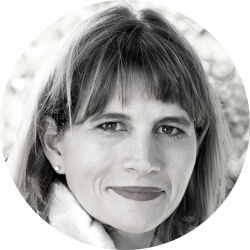The Market Corner: Working at the Nexus of Health and the Environment
Image

For the second installment of the Market Corner blog series, Holly Lard Krueger speaks with sustainable development expert and primary care clinician Liz Willetts about the interconnectedness of our health and environmental systems, the voice missing from global policy decision-making tables, and the true cost of that lack of representation. Access February’s first installment here.
COVID-19 is a vivid example of the interconnectedness of our health and environment systems.
According to Liz, “We have reached critical points where our ecosystems are extremely broken down. We've lost biodiversity across many scales as well as caused other environmental degradation and disturbance, and now those problems are starting to impact human health and the global economy in a really broad and deep way.”
The global COVID-19 pandemic is a vivid example of how environmental degradation can precipitate wide-ranging health and ultimately economic impacts. Estimates for the economic shock of COVID-19 to the global economy are in the trillions, with 2020 estimates ranging from $3.5 trillion USD per year up to $16 trillion USD total. In 2022 the International Monetary Fund quoted the COVID-19 bill as $12.5 trillion USD through 2024. But, according to Liz, other forms of environment-induced health impacts are similarly costly. The annual global cost of malnutrition due to compromised food systems and asthma and other health impacts due to air pollution are each approximately $3 trillion USD per year. Avoiding tremendous health costs with sound environmental policies makes economic sense, she says.
Nonetheless, COVID-19 has heightened global attention to the topic and galvanized health professionals' advocacy for inclusion in global environmental policies. Last year, for example, in the lead up to the UN Climate Change Conference (COP 26), 220 medical journals worldwide united to demand climate action, asserting that failure to keep the temperature rise below 1.5 degree Celsius is the greatest threat to public health.
We need a microphone within the negotiations, not a megaphone at the margins.
The WHO estimates that almost 25 percent of global deaths are linked to the environment but surprisingly, health professionals do not traditionally have a widely recognized role in environmental policy decision-making fora. According to Liz, public health experts are noticeably missing from international policy discussions on subjects ranging from the food system to climate change to conservation. Liz says that “she is consistently surprised that there aren't more health representatives in the [policymaking] room on topics that affect disease burden.”
Instead of having a seat at the table, health professionals often find themselves downstream from these policy decisions dealing with the human health consequences, like sky-rocketing diabetes and asthma rates, and high prevalence of depression and anxiety. Liz thinks that the knowledge earned and the urgency felt by frontline clinicians who face the incredible wave of nutritional diseases and environment-related traumas on a daily basis is missing from the room where major global environmental decisions are being made.
Liz believes that “a microphone within the negotiations is more powerful than a megaphone at its margins.” She co-authored Health in the Global Environmental Agenda: A policy guide to equip health professionals with the necessary evidence and language to engage and advocate for health provisions in global environmental agreements.
My role is to connect the dots.
Interconnection between human health and the environment is what drew Liz to a hybrid career in medicine and sustainable development. As a biology student, early on she intended to study medicine after graduating, but chose to work for a community development organization near her university to start her career. “It was obvious every day of my three years in that job that the determinants of health went far beyond the physiology we are born with. I learned health is determined by a wide range of factors, including how we understand our own bodies, the foods we have available to nourish ourselves, our relationship with our own culture, and the social factors that determine our levels and types of stress. Those determinants are not treatable with medicines.”
For the last 20 years, Liz has worked at the nexus of health and the environment, in roles at both the local and global levels. The influence of these two different fields on one another has long been acknowledged by indigenous cultures. However, it was not until 2015 that planetary health emerged as a formal field of study in the Western world. Liz believes that there is a lot of work still needed to connect the dots.
She sees that her role is to break down traditional silos between the fields and help to advance a systems-thinking, multidisciplinary approach. She does this by building cultural competencies between health and environment professionals and equipping them with a common language. Prior to the recently published Health in the Global Environmental Agenda: A policy guide, there was no foundational resource on the planetary health global policy landscape, no go-to resource for interested professionals.
The stakes are real. The interconnectedness of our environmental and health systems needs to be recognized within global environmental policies, and Liz is dedicated to creating a seat for medical professionals at the table. Creating a shared language and cultural competencies between environmental and medical professionals are two ways in which she is raising awareness of the health-environment nexus. “It is time for the health sector to play a larger role in how we design and influence our relationship with nature,” she says.
Have examples of ways in which your project is using a multidisciplinary approach to solve development problems? Post via your Marketlinks account or just send them to us at info@marketlinks.org and we may include them in the next installment of the blog.
About
Image

Liz Willetts
Liz Willetts is a primary care clinician who, for the last 13 years, has also worked for the International Institute for Sustainable Development as a policy reporter and analyst attending UN intergovernmental negotiations on environment and development. She is an expert on local-to-global issues at the health-environment nexus (the field of Planetary Health),and has experience following global discussions on climate (UNFCCC), biodiversity (CBD, IPBES, ITPGRFA, Cartagena Protocol), food security (UN Committee on World Food Security), water (UN-Water), chemicals and waste (Basel and Rotterdam Conventions), and health (World Health Assembly). She received a master’s in environmental economics and policy from Duke University and a master’s in medicine from Emory University. She also holds an undergraduate biology degree from the University of Pennsylvania.
Image

Holly Lard Krueger
Holly Lard Krueger is a managing partner at the Canopy Lab and a market systems development expert with over 15 years of experience providing technical advice in the field of private sector development/engagement with a specific focus on applying digital technology, gender equality and social inclusion (GESI), market systems, and Value for Money (VfM) principles to project and strategy design for agriculture, humanitarian aid, business enabling environment reform, trade, urban development, and women’s economic empowerment programs.
Holly is a proven strategic leader, having managed large market systems projects with diverse teams. She is also skilled as a strategic advisor, coach, and trainer in the practical application of systems approaches to market development, and she is currently an advisor to USAID’s Bureau for Humanitarian Assistance, a World Bank-funded program in West Africa (TFWA), a DFAT-funded program in Indonesia (PRISMA), and a FCDO-funded program in the Democratic Republic of the Congo (Essor). Holly is based in Morocco and has worked in over 15 countries in Africa, Asia, and the Middle East and has implemented projects and conducted evaluations for leading donors, including the Bill & Melinda Gates Foundation, DFAT, IFC, FCDO, USAID, and the World Bank. She has an M.A. from Johns Hopkins School of Advanced International Studies and a B.A. from Vanderbilt University.


